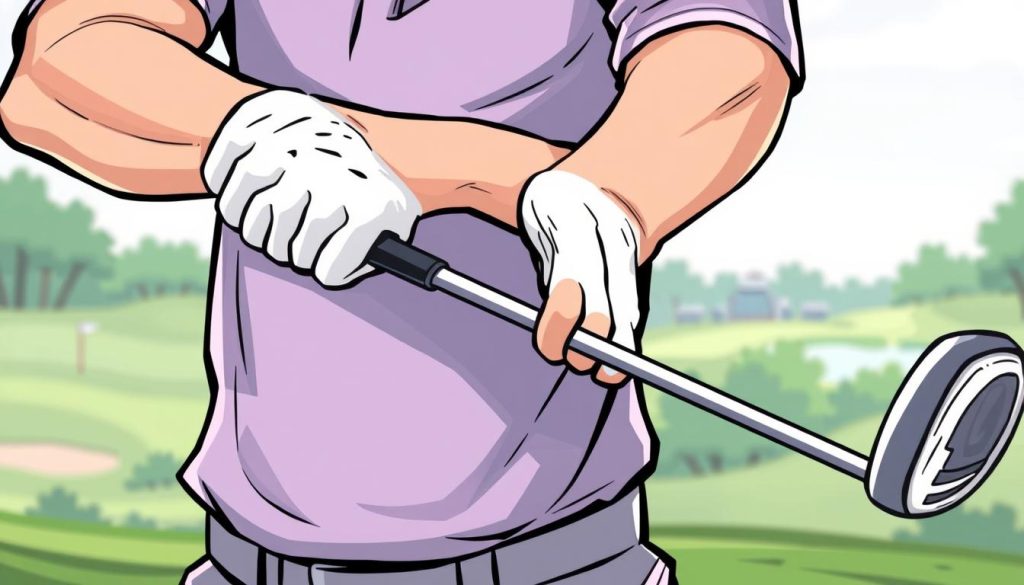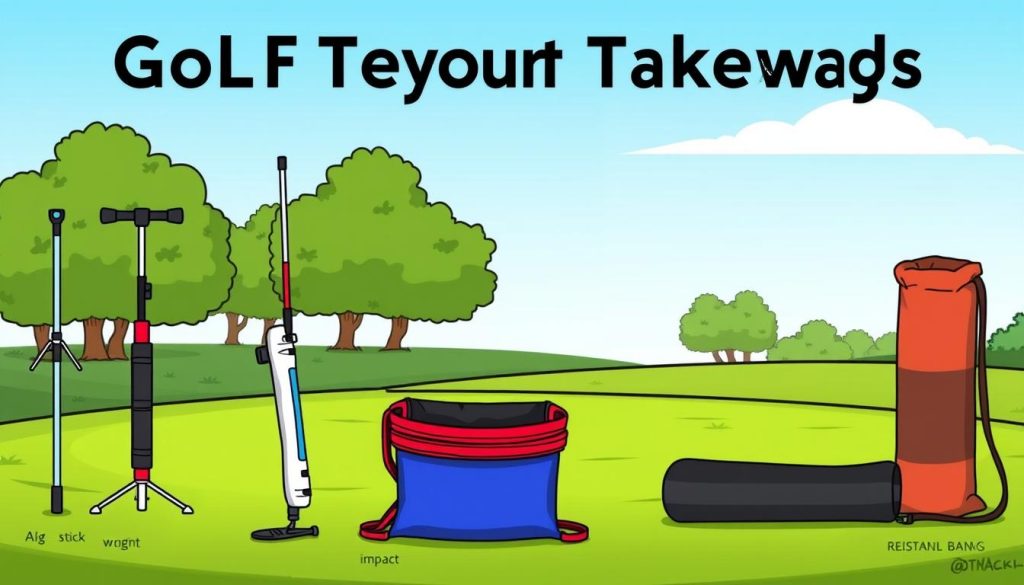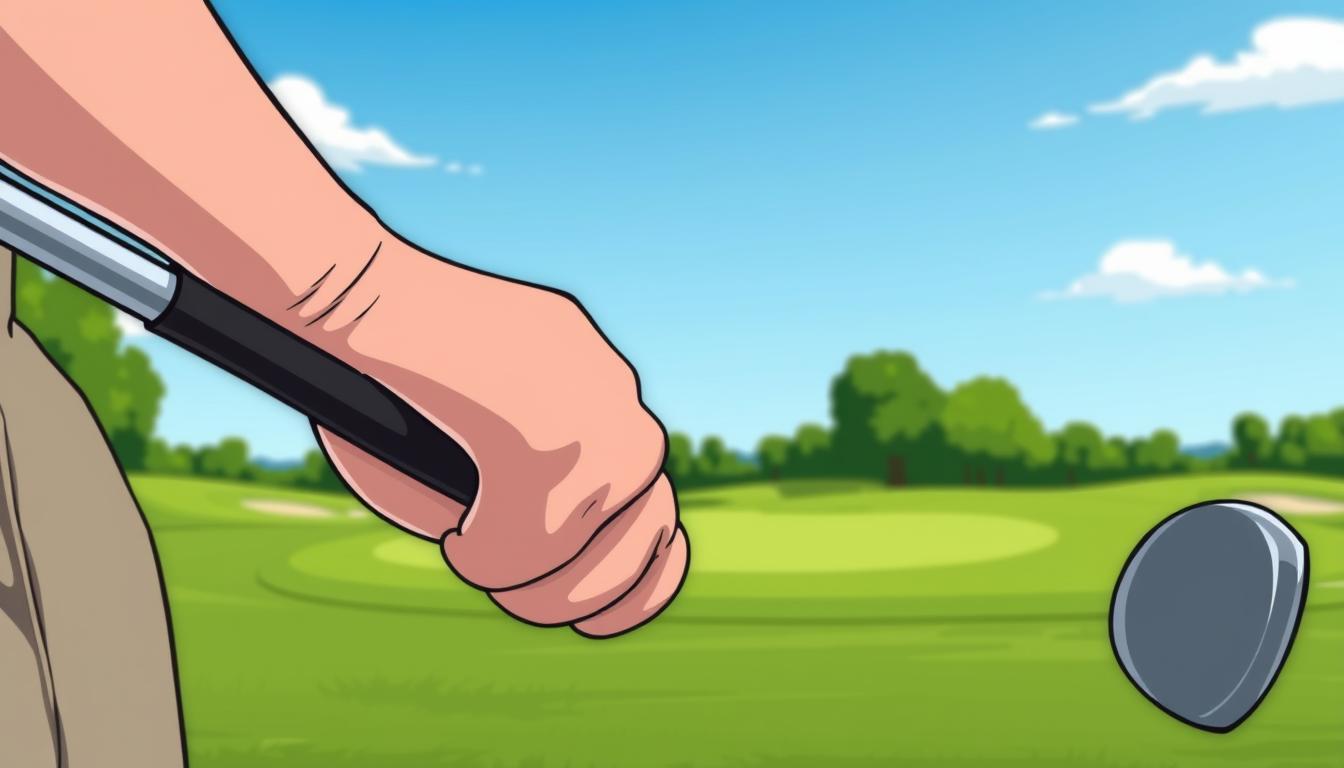Your golf swing takeaway is key to a good swing. It’s the first step in your backswing, setting the stage for the rest. Learning the right way to take the club away is vital for bettering your swing and game.
A great takeaway is more than just moving the club. It needs a good grip, setup, and weight balance. When done right, it guides your club on the right path, improving your swing and hitting.
Knowing the basics of your swing is essential for a great takeaway. It’s not just about moving the club. It’s about moving your body smoothly for a better swing. By focusing on your takeaway, you’ll hit your shots more consistently and accurately.
Key Takeaways
- The takeaway sets the foundation for your entire golf swing
- Proper technique involves grip, setup, and weight distribution
- A good takeaway positions the club on the correct swing path
- Coordinating body movements is crucial for an efficient swing
- Mastering the takeaway leads to improved consistency and accuracy
Understanding the Fundamentals of Golf Swing Takeaway Guide
The golf takeaway is the start of your swing, setting up for a great shot. Learning the basics of takeaway is key to bettering your swing and playing better golf.
What Defines a Golf Takeaway
A golf takeaway is when you first move the club away from the ball. It’s a mix of arm, shoulder, and body movement. Getting this right helps your club head start on the right path.
The Critical First Move
The first part of your takeaway should be smooth and controlled. Many beginners have trouble keeping a steady pace. A neutral grip is important for a correct takeaway. Keep these tips in mind:
- Keep your clubface parallel to your spine angle
- Align the club with your foot during the backswing
- Focus on a coordinated motion away from the ball
Impact on Overall Swing Mechanics
Your takeaway affects your whole swing. A good takeaway leads to a better backswing and a strong impact. But, if you mess up the clubface or mass, you might face:
- Inaccurate shots
- Wasted energy
- Swing path issues like hooks and slices
| Common Takeaway Mistakes | Potential Consequences |
|---|---|
| Incorrect body movements (turning instead of pivoting) | Swing inefficiencies, slices |
| Mishandling club face | Inaccurate shots |
| Inconsistent speed | Loss of control, power reduction |
By working on these takeaway mechanics, you’ll lay a strong foundation for your swing. Focus on these basics to enhance your golf game and get more consistent results.
Essential Components of a Proper Setup Position
A solid golf setup position is key to a good swing. By focusing on key elements, you can improve your game. This leads to better results on the course.
Grip and Hand Positioning
A proper golf grip is crucial for controlling the club. There are three main types: overlapping, interlocking, and baseball grip. Try each to find what feels most natural for you.
Place your hands on the club so your palms face each other. This creates a unified unit.
Stance and Alignment
Your golf stance alignment is vital for hitting the ball right. Stand with your feet shoulder-width apart, parallel to the target line. Make sure your hips and shoulders are square to this line.
This setup helps your body be in the best position. It makes your swing smooth and powerful.
Weight Distribution Basics
Proper weight distribution is key for balance in your swing. At address, keep your weight evenly on both feet. This balanced stance helps with a smooth swing.
| Component | Key Points |
|---|---|
| Grip | Choose from overlapping, interlocking, or baseball grip |
| Stance | Feet shoulder-width apart, parallel to target line |
| Alignment | Hips and shoulders square to target line |
| Weight Distribution | Evenly balanced between both feet |
Mastering these key components of a proper golf setup position is crucial. It sets you up for a consistent and effective swing. Remember, practice and patience are essential for a solid golf game. A strong golf setup lays the foundation for not only power but also accuracy in your shots. Incorporating golf swing consistency tips into your practice routine can further enhance your ability to maintain proper alignment and tempo. Over time, this attention to detail can drastically improve your overall performance on the course.
The One-Piece Takeaway Method
The one-piece takeaway is a key golf technique. It makes your swing better by moving your club, arms, and shoulders together. This creates a smooth golf swing from the start.
When you do a one-piece takeaway, keep your arms and chest in a triangle shape. This wide arc helps you swing consistently. It also prevents common mistakes like swinging too far inside or outside.
Many beginners rush their takeaway, trying to hit the ball harder. But, a slow and controlled move is essential for a good one-piece takeaway. This method helps your backswing and downswing work better together.
Benefits of the One-Piece Takeaway
- Improves consistency
- Reduces chances of hooks and slices
- Enhances power transfer
- Promotes better club head control
Start practicing your one-piece takeaway with shorter clubs. As you get better, move to longer clubs. This helps you feel the wider takeaway and improves your swing extension.
| Common Takeaway Mistakes | One-Piece Takeaway Solution |
|---|---|
| Rushed movement | Slow, controlled start |
| Wrist hinge too early | Maintain arm-shoulder connection |
| Rotating hands prematurely | Keep hands passive, shoulders lead |
| ‘Flying elbow’ | Keep arms close to body |
Mastering the one-piece takeaway takes time and effort. Be patient and focus on feeling your body move as one. Your golf game will thank you!
Mastering the Clubface Control During Takeaway
Clubface control is key for a solid golf swing. A square clubface at impact is essential for straight shots. Let’s dive into how to master this important part of your game.
Maintaining Square Clubface
To keep your clubface square, focus on your grip and wrist position. Avoid too much wrist movement. Too much extension opens the clubface, while too much flexion closes it. Pros keep their wrists almost still from setup to the backswing’s top.
Common Clubface Errors
Golf swing errors often come from wrong clubface positioning. An open clubface leads to slices. A closed clubface can also cause issues. These problems usually come from bad grip, wrist angle, or rotation.
Correction Techniques
To fix clubface problems, try these:
- Practice with alignment rods to see the right clubface position
- Use a mirror to check your grip and clubface alignment
- Work on a one-piece takeaway
- Focus on proper weight shift during your swing
| Clubface Position | Likely Result | Correction |
|---|---|---|
| Open | Slice | Strengthen grip, focus on rotating hands |
| Closed | Hook | Weaken grip, maintain wrist angle |
| Square | Straight shot | Maintain current technique |
Mastering clubface control takes time and practice. Focus on these tips to boost your accuracy and consistency on the course.
Body Rotation and Shoulder Turn Mechanics
Golf body rotation and shoulder turn are key to a good golf swing. A strong takeaway is the start of a powerful shot. Let’s explore how to improve your golf game through these elements.
The takeaway starts with a slight shoulder rotation around your spine. As you swing back, turn your upper body away from the target. This adds width and prepares for a strong swing forward. Your lower body should also move, keeping balance.
To better your rotation:
- Start with a proper setup position
- Begin the takeaway with your shoulders
- Let your hips turn slightly
- Keep your arms connected to your body
- Keep your lower body stable
A good shoulder turn is key to power. Try to rotate your shoulders about 90 degrees back. This builds tension between your upper and lower body, readying for the swing forward.
| Component | Ideal Rotation | Common Mistake |
|---|---|---|
| Shoulders | 90 degrees | Over-rotation |
| Hips | 45 degrees | Minimal rotation |
| Arms | Connected to body | Disconnected, flying elbow |
Flexibility is crucial for effective rotation. Stretching regularly can help improve your range of motion. Mastering body rotation and shoulder turn will lay a solid base for a consistent, powerful golf swing.
The Role of Arms and Hands in Takeaway
Your golf arm position and hand movement are key for a strong and precise shot. Learning these can boost your game, adding 15-20 yards to your drive.
Creating the Perfect Triangle
Make a triangle with your arms and chest during the takeaway. This shape keeps your swing consistent and controlled. Keep your torso still while letting your hands and arms swing the club fast.
Maintaining Connection
Keep your arms connected to your body during the takeaway. Point the club’s butt down the target line in your backswing. This boosts power and improves your release at impact.

Wrist Hinge Timing
The wrist hinge is vital in your swing. Don’t hinge too early in the takeaway. Let it happen gradually as you finish your backswing. This timing controls the clubface and sets up a strong release.
Focus on using your elbow to bring the club back, not just your wrists. Imagine your elbow pointing at the target. This helps position the club better for a powerful downswing.
Remember, too much tension in your hands and arms can ruin your takeaway. Practice keeping them relaxed for the right swing path and alignment. By mastering these, you’ll hit the ball farther and more accurately with less effort.
Common Takeaway Mistakes and Solutions
Golf takeaway errors can really hurt your swing. It’s key to know these swing faults and fix them to get better. Let’s look at some common mistakes and how to solve them.
One big mistake is taking the club too far inside or outside. This can cause an off-plane swing and make hitting the ball hard to do. To fix this, try a one-piece takeaway. Move your arms, shoulders, and club together as one unit.
Another problem is breaking your wrists too early. This messes up the swing’s timing and power. Keep your wrists firm until the club hits your waist. This helps keep the swing in order.
Another issue is letting your arms disconnect from your body. This makes your swing less consistent. Keep your arms and chest in a triangle shape during the takeaway. This helps you control your swing better.
| Common Mistake | Solution |
|---|---|
| Incorrect club path | Use alignment sticks for visual feedback |
| Early wrist break | Practice one-piece takeaway drills |
| Disconnected arms | Use a towel under armpits during practice |
| Over-rotation | Focus on shoulder turn, not hip turn |
Using video analysis can help spot these errors. Record your swing and watch it to find what needs work. Fixing these mistakes will make your golf swing more consistent and effective.
Training Aids and Drills for Perfect Takeaway
Golf training aids and drills are key to a great swing. Let’s look at some ways to better your takeaway.
Using Alignment Rods
Alignment rods are great for your takeaway. They help keep your club and body on the right path. This tool ensures a smooth 45-degree shoulder turn and less hip movement.
Mirror Practice Techniques
Practicing in front of a mirror gives you instant feedback. Focus on pulling your shoulder blade back. This small action can move the club a lot, showing the power of good motion in golf.

Video Analysis Methods
Video recording changes the game for golf swing analysis. It lets you see your takeaway closely. Look for these key points: the club should be parallel to the ground and the target line, and right over your toes with the clubface up.
| Training Aid | Purpose | Key Benefit |
|---|---|---|
| Alignment Rods | Ensure proper alignment | Improves club path and body positioning |
| Mirror | Visual feedback | Helps perfect shoulder blade movement |
| Video Analysis | Detailed review | Allows for precise technique refinement |
Remember, being consistent is crucial in golf. Regular use of these drills and aids will build muscle memory and enhance your swing.
Adapting Takeaway for Different Clubs
Your golf swing takeaway is the base of your swing. While the main ideas stay the same, small changes for each club can boost your game. Knowing these adjustments helps you swing better and hit the ball more accurately.
Drivers need a wider arc for more power. This lets you turn your shoulders fully. Irons require a more compact arc for precision. Wedges need a smaller arc for finesse, not power.
How you distribute your weight affects your takeaway. Most clubs need even weight for a stable swing. Adjusting your stance and ball position helps with each club.
Consistency is crucial. Keep your arms straight, body together, and clubface square, even with adjustments. Practice these changes to improve your golf game.
- Drivers: Wider arc, fuller shoulder turn
- Irons: Compact takeaway, focus on precision
- Wedges: Smaller scale, emphasis on finesse
- Maintain consistent fundamentals across all clubs
Mastering these techniques will help you succeed with any club. You’ll play better all round.
Building Consistency in Your Takeaway
Mastering a consistent golf swing takeaway is key to improving your game. Many amateurs struggle with controlling the speed of their takeaway. This can lead to inconsistent shots. To build a reliable takeaway, focus on specific practice routines and mental checkpoints.
Practice Routines
Start a structured takeaway practice routine to improve your swing. Begin with slow-motion drills, focusing on the initial move away from the ball. Pay attention to your weight distribution during setup, as it affects your takeaway.
Gradually increase speed as you get more comfortable with the motion.
Mental Checkpoints
Set mental checkpoints for proper positioning and movement during your takeaway. Avoid pulling your hands back instead of engaging your body. Remember to maintain a consistent takeaway across different golf clubs, adjusting only for the club length.
Progressive Learning Steps
Use progressive learning steps to refine your takeaway technique. Video analysis can help spot areas for improvement in your swing. Use training aids like alignment rods or the StraightAway device to troubleshoot issues.
Regular practice and self-assessment, along with professional instruction when needed, will improve your takeaway. This will elevate your golf performance.
FAQ
What is the golf swing takeaway?
Why is the takeaway important in golf?
What is a one-piece takeaway?
How should the clubface be positioned during the takeaway?
What role do body rotation and shoulder turn play in the takeaway?
What are some common takeaway mistakes?
Are there any training aids that can help improve my takeaway?
Do I need to adjust my takeaway for different clubs?
How can I build consistency in my takeaway?
What is the correct timing for wrist hinge in the takeaway?
Source Links
- https://meandmygolf.com/golf-tips/irons-tips/a-step-by-step-guide-to-a-better-takeaway-in-your-golf-swing/
- https://golf.com/instruction/master-golf-takeaway-drill-jason-baile/
- https://www.performancegolf.com/blog/mastering-the-golf-takeaway-in-6-essential-steps?srsltid=AfmBOopfUOmSpZsypRhzamj8bNjLprA_A-rUJs2el6_2o-NnBXLilBJD
- https://www.performancegolf.com/blog/mastering-the-golf-takeaway-in-6-essential-steps?srsltid=AfmBOoo4CcU4_iwtisdOG0xM83V0WMyWdr_9SFTr_7etuwjgdYrbRhOk
- https://www.dannymaude.com/blog/Simple Takeaway Drill – This golf swing takeaway drill was a GAME CHANGER for a recent student
- https://nationalgcla.com/the-basics-of-the-golf-swing/
- https://www.performancegolf.com/blog/mastering-the-golf-takeaway-in-6-essential-steps?srsltid=AfmBOoogF7DssCpmka1jU6yasJy-OUAhJDZOawVtEf9Y0eChhmdZfLXL
- https://www.performancegolf.com/blog/mastering-the-golf-takeaway-in-6-essential-steps?srsltid=AfmBOopB6Ii31Q81fJbFOWR5AUEdijIIYKFla7UEJRhdXoexA88c68xr
- https://www.streetdirectory.com/travel_guide/205094/golf_guide/the_one_piece_takeaway_in_your_golf_swing_40pt_141.html
- https://hackmotion.com/how-to-square-clubface/
- https://skillest.com/blog/a-comprehensive-guide-to-mastering-the-golf-swing/
- https://rotaryswing.com/golf-instruction/club-face-rotation-golf
- https://hackmotion.com/body-rotation-in-golf-swing/
- https://rotaryswing.com/c4/112204-golf-takeaway-overview
- https://www.dannymaude.com/blog/the-golf-swing-is-so-much-easier-when-you-rotate-correctly
- https://www.dannymaude.com/blog/Two things your hands and arms must do to play great golf
- https://golfgreens.com/golf-pro-tips/what-should-a-proper-takeaway-feel-like/
- https://www.performancegolf.com/blog/mastering-the-golf-takeaway-in-6-essential-steps?srsltid=AfmBOorAmGLUeAWiLJlQPk8JI7-GNH1qYOn57POt16womEO48njRYq67
- https://hackmotion.com/common-golf-swing-mistakes/
- https://hackmotion.com/takeaway-problems-that-lead-to-poor-wrist-action/
- https://rotaryswing.com/c4/95-golf-swing-takeaway-drills
- https://www.golfmonthly.com/best-golf-deals/best-golf-training-aids-137815
- https://swingfit.net/golf-swing-mechanics/
- https://www.performancegolf.com/blog/mastering-the-golf-takeaway-in-6-essential-steps?srsltid=AfmBOoq6IFZmN3bEHlirqT6mRhfZdcQeV3HKD6qcJAVSoZ3d86VtVqTF
- https://hackmotion.com/best-golf-takeaway-drills/
- https://golf-info-guide.com/video-golf-tips/how-to-complete-a-long-and-slow-takeaway-during-the-golf-swing-video/
- https://www.performancegolf.com/blog/mastering-the-golf-takeaway-in-6-essential-steps?srsltid=AfmBOoqLfqGS19bkF5LY4alSfLQId9DaRV6_KWVg8WOWA9l5AjedVztV
- https://www.dannymaude.com/blog/CREATE A CONSISTENT GOLF SWING


